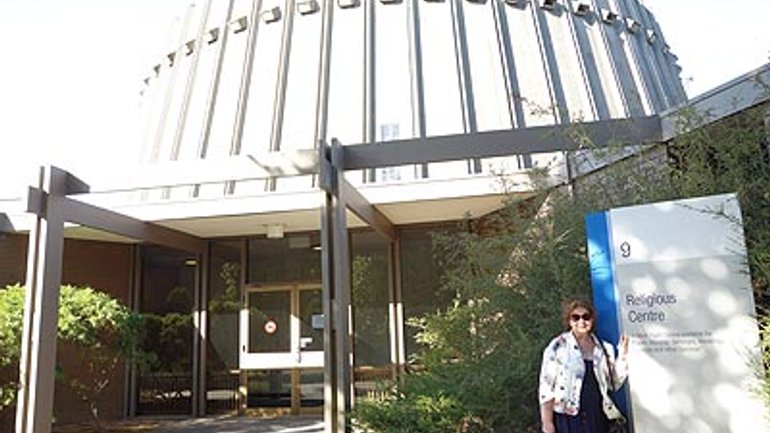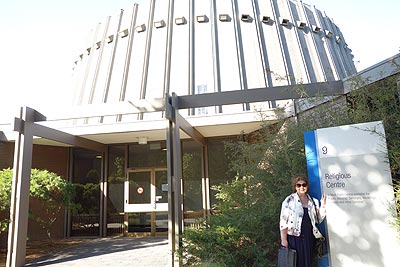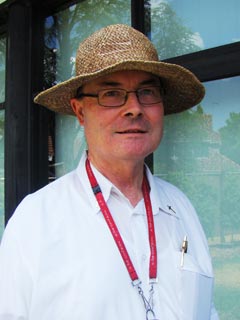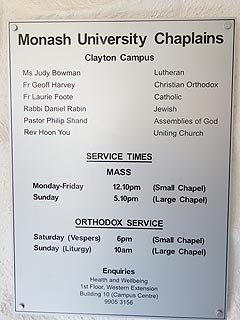Religious Center at Monash University in Australia Includes Ukrainian Center

Monash University (Australia, State of Victoria) is included in the top 100 universities in the world and for several years is in an honorable 10th place in this “golden hundred.” Monash University, like most universities, lives its own, somewhat isolated, life.

But unlike most other universities, Monash has a Religious Center. And it really is in the center of campus. Followers of different faiths and denominations can come to this center, attend a service, consult a priest, celebrate religious holidays, or even marry or baptize a child. An increasing number of people go for the latter – it is evident that college students are not only concerned with problems of education. Even in Australia.
 I met one of the ministers of the Religious Center, Father Laurence Foote, at the conference “Ukraine: Language, Culture, Identity,” which was held in the Mykola Zerov Center for Ukrainian Studies at Monash University (director of the center is Marko Pavlyshyn). And later I saw him at the Sunday Liturgy at the Greek Catholic Church in Melbourne, where Father Foote celebrated a mass. I had a few questions for Father Laurence Foote.
I met one of the ministers of the Religious Center, Father Laurence Foote, at the conference “Ukraine: Language, Culture, Identity,” which was held in the Mykola Zerov Center for Ukrainian Studies at Monash University (director of the center is Marko Pavlyshyn). And later I saw him at the Sunday Liturgy at the Greek Catholic Church in Melbourne, where Father Foote celebrated a mass. I had a few questions for Father Laurence Foote.
— The pastor of the university is a very rare specialty? Who attends this chapel?
— Since 1984 I am a Catholic pastor at Monash University. We take turns holding services – there are certain hours for Catholics, Orthodox, Lutherans, Jews, and Muslims. Teachers and professors come to our services, but most of those who come to the university church are students. Sometimes their relatives come, but almost all are studying or working at the university.
— Do only Catholics attend your services?
— Yes, almost all are Catholics, but others come as well, students, sometimes professors who are interested in the Catholic religion. These are people of different nationalities, not only the descendants of Europeans and Latin Americans, as most think. We have Eastern Catholics from India. There are also believers from the Syrian Church and these people have their own priests in Melbourne, but sometimes their parishes are far from the university, so they come to the Roman Catholic chapel.
— And what about Greek Catholics?
— There are few Greek Catholics students at Monash University. But there are some, and during my service here they have all became my friends.
— You speak Ukrainian very well, who or what made you learn our language?
— Professor Marko Pavlyshyn, Greek Catholic priests, and Basilian nuns in Adelaide. I already knew Croatian. I spoke to the Basilians in Croatian, and they answered in Ukrainian, and little by little I started to learn to speak Ukrainian. The Dominicans sent me here in 1982 to be the chaplain at Monash. I was very interested in Eastern European Churches. Bishop Ivan Prashko asked me why I didn’t help out in the eparchy, was I not interested Ukrainian language, culture, theology, etc.? I hesitated a little, but on the next day I went to Bishop Ivan Prashko and asked him to make me a member of the eparchy. So in 1984 I started to work in the Ukrainian Greek Catholic Church.
— What about your parishioners, do they often come to confession, or just before a big holiday?
— Yes, people come to confession. We do not have specific hours for confession. But people send me e-mails or text messages or call, and ask if they can confess in half an hour. I say, OK, where?
— So you do not always hear confessions in church?
— Correct, sometimes in my room, at the college, sometimes in the church, sometimes on campus.
— Even on a walk?
— Yes. True. On a walk, at the park, sometimes in a coffee shop. If they need to speak with me as a representative of the church, why not?
 — With what sort of problems do your students come to you?
— With what sort of problems do your students come to you?
— Many problems, but I think that these are the same problems that are in Ukraine. Relationships with family, friends, boys and girls, friendship, and academic problems. Sometimes it is very difficult for them and they want to go home, they have difficulty adapting to university life. But most feel at home here, after two or three weeks. I always try to help them.
— Do many Ukrainian students come to you?
— Not so many. Because here in Melbourne, most Ukrainians attend Orthodox churches. They come to Monash mainly for Ukrainian Studies and here to learn Ukrainian.
— Not only Ukrainians or students with Ukrainian roots come here to learn Ukrainian?
— Ukrainians, students from Ukrainian families, Ukrainians, who were born in Australia. Although there are those who are interested in language, culture, the church in Ukraine.
— Do those who were born in Ukraine find their way to the House of All Religions?
— Yes. I meet with students from Ukraine. They always come to the Monash Religious Center. Some are just interested, but for others it is a necessity because they are true Christians.
— What problems do you encounter when you work with Ukrainian families?
— Problems concerning the identity of the Ukrainian Church. I think for me as a priest, a very important issue is the identity of your church. Ukrainian Christianity is a minority in Australia. And the children, even those who go to church, do not always understand the uniqueness of Ukrainian Christianity. Almost all schools in Australia are Roman Catholic and almost all of the Ukrainian children’s friends are Roman Catholics. This hinders them from studying the history of the church of their fathers and grandfathers.
— In Ukraine, the Catholic Church carries out a lot of social work with the youth. The clergy and faithful of the church try to prevent abortions, help people overcome drug addiction, alcoholism, and gambling. Have you students come to you with such problems?
— Yes, because there are many similar problems, but among college students today drugs are less of a problem. There is a problem, but most students know that they must study and work hard. And they know that drugs and alcohol do not help. But I think that in Australian universities alcohol among some students is a big problem. And this is a problem not only in universities; it is a big problem for all of Australia. There is a big problem with all types of people at the university and outside of it, maybe even since the first days of the Australian colony. Gambling is also a problem for students, but less than alcoholism.
But abortion almost never happens. Young people, especially Christian, are very committed to the future. And the social protection of children and parents in Australia is at the highest level. So more and more I have the honor to baptize little Roman and Greek Catholics.
— You also serve in the Greek Catholic Church. Please tell me, do you read the sermons in Ukrainian?
— Yes. At the Religious Center I also communicate with Ukrainians in their language. Of course, after serving in the Greek Catholic Church, I always preach to the parishioners for 7-10 minutes in Ukrainian, and then 4-5 minutes in English. So that everyone could understand.









